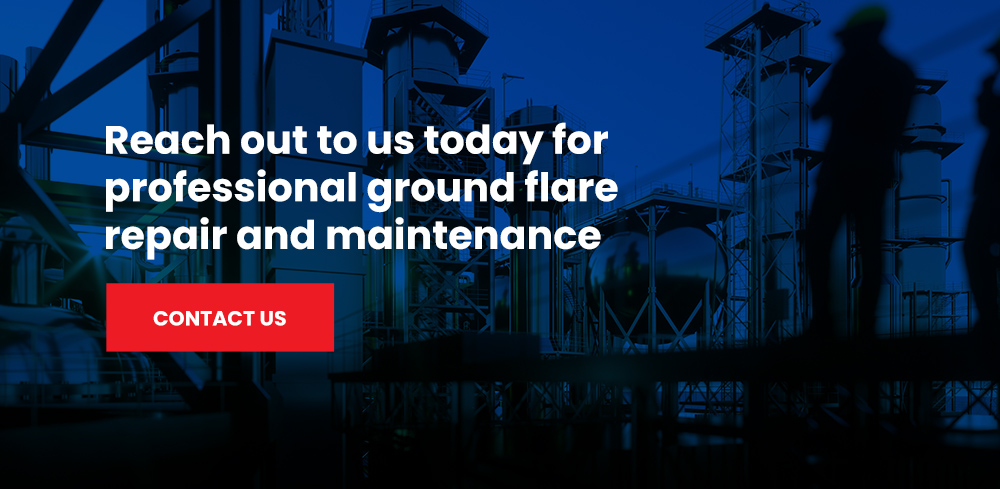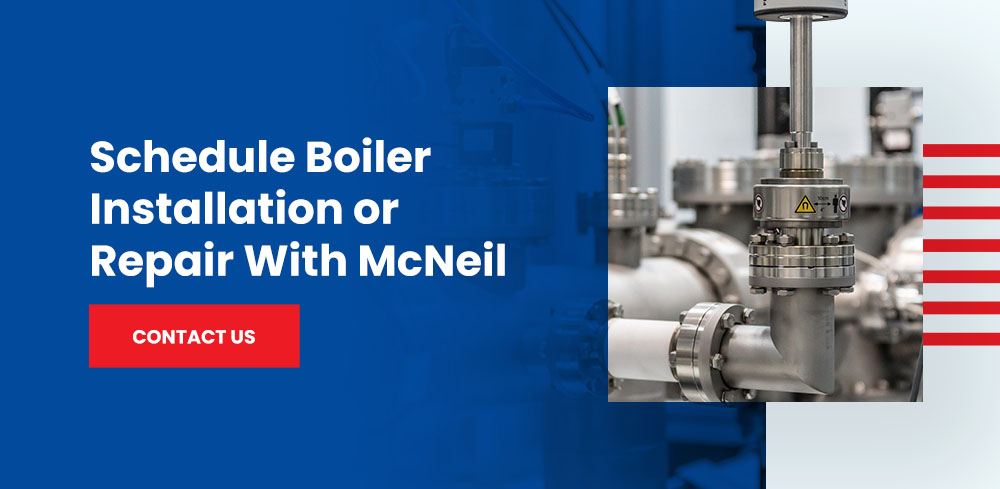A Guide for Ground Flare Repair
Ground flare systems offer unique benefits and challenges to industrial facilities. As one of the most important parts of an industrial plant, flare systems enhance safety for workers and the environment. Like every other well-used system, they need regular maintenance and occasional repair.
Repairing a ground flare system can be expensive since it requires all plant operations to stop. Keep reading to learn more about the different components of a ground flare system, which parts may require maintenance and how you can best handle the repair process.
Flare Design and Types
Several types of flare systems are used across industries. They can be divided first based on height. Many flares are elevated so their ignition source remains far away from other parts of the industrial compound. Ground flares are built in their own area with a radiant heat fence for similar protective reasons.
Industrial plants sometimes use assistance in the form of steam, air or pressure to improve mixing at the flare tips in their compound. Steam- and air-assisted flares are often elevated for safety reasons, but non-assisted, pressure-assisted and multipoint pressure-assisted flares can be built at elevation or ground level.
There are several structural models for ground flares. Some ground-level flares are enclosed, while others have an open-flame design. Enclosed ground flares are built inside an insulated shell. This protects the flares from wind disturbance and reduces both heat radiation and visible light during the flare process.
Open-flame ground flares are built with a radiant heat fence and tend to cover more ground than enclosed ground flares. The open-flame design has a higher capacity for venting gases, while the enclosed design is often chosen for plants that need a lower, constant flow for vent stream.
When Is a Ground Flare System Best?
The best flare design for your facility depends on several factors, including:
- Type of flare gas.
- Amount of available space.
- Cost-efficiency.
- Safety factors.
- Community concern.
Many communities don’t understand that flares are a sign of environmental protection — these flames are created because your plant has burned off toxic gases and is releasing healthier ones into the atmosphere instead. Covering flares with a ground design can increase community peace of mind.
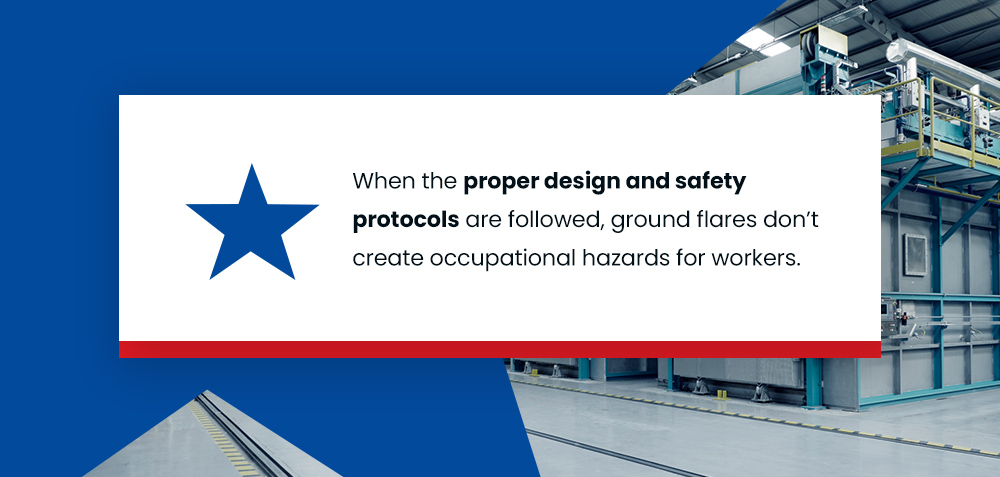
When the proper design and safety protocols are followed, ground flares don’t create occupational hazards for workers. Radiant heat shields protect employees during maintenance, and plant layout design keeps ignition sources away from the rest of the operation.
Understanding the Components of a Ground Flare
Ground flares have several components, depending on whether they’re enclosed or open-flame. The largest difference between ground flares and elevated flare systems is that ground systems don’t have a stack or other mechanisms to support the elevation of gases.
Here’s a quick list of common ground flare components:
- Relief valves
- Knock out drum
- Liquid seal
- Piping
- Gas pilot
- Pilot reignition system
- Smoke suppression assist system
- Refractory wall or radiant heat shield
To optimize your plant, ground flare systems may have small variations in design. It’s wise to work with a professional who can design the safest and most efficient ground flare system to meet your needs. Make sure you understand every element of the design and how they work together.
Step-by-Step Guide for Ground Flare Repair
Over time, these components will require maintenance to ensure they continue operating at top performance levels. Because flares are part of your compound’s safety system, they’re incredibly important.
Each component should be checked and serviced on a regular schedule to prevent issues with the flare system and your plant at large. However, even with regular checks, sometimes repair is necessary. Parts wear out over time, and it’s better to discover this during maintenance than to experience an interruption in regular workflow.
Assessing the Damage and Preparing for Repair
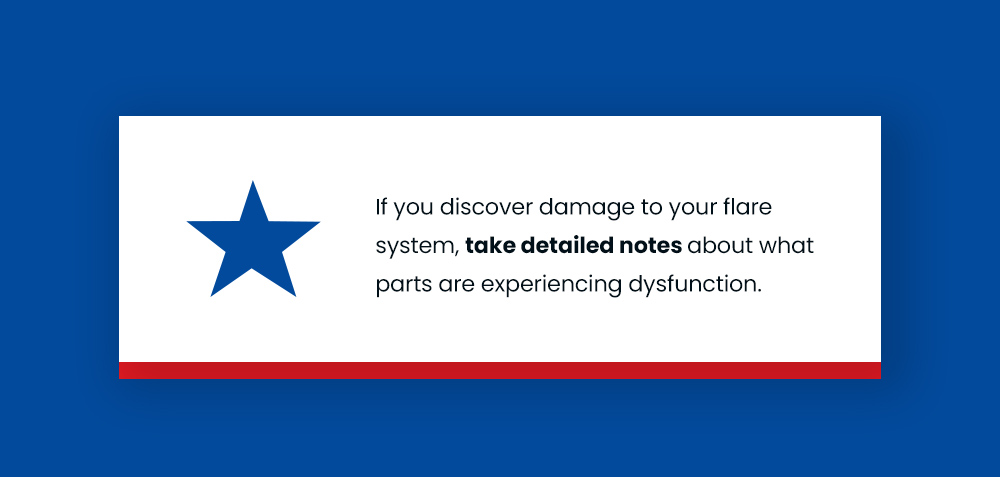
If you discover damage to your flare system, take detailed notes about what parts are experiencing dysfunction. Each piece of the system is essential for safe and reliable operation. Here are a few examples of issues you might encounter:
There could be external damage to components, either from weather or years of use. Check the following:
- Refractory lining
- Radiant heat shield
- Piping and pilots
- Assist systems
There could also be internal problems with the system, reducing function and safety. To find out, ensure that:
- There’s no air in the system.
- All filters and valves work.
- Pipe slopes allow for gas flow.
- Each component works well.
You can check for external damage by visually checking each component of your ground flare system. Of course, workers should never be inside the system while it’s functioning. Visual checks should be fast, easy and uncomplicated — to anyone who’s familiar with the industry, external damage should be obvious.
To check for internal issues, you’ll need to schedule an inspection. Workers may also notice changes in system behavior or reduced performance levels, which can give clues as to what is happening. If you’re concerned about performance changes, it’s a good idea to have a professional inspect your system.
Once you’ve noted all damage, the next step is to schedule repairs for your ground flare system. When every component is working at its best, the system will continue to perform safely and support top production at your industrial compound.
Maintenance Tips to Prevent Future Repairs
To reduce the potential for damage and repair costs, conduct regular maintenance for your ground flare system. Both enclosed and open-flame systems have specific strengths and weaknesses, and eventually, parts will wear out.
However, like other machines, ground flares last longer and perform better with regular checks. The legal requirements for flare inspection depend on the flare design, your facility’s purge rate, the age of your plant and more. You should take advantage of every opportunity to have your flares inspected.
Why Choose McNeil for Ground Flare Repairs?
McNeil has served customers with heat-management services since 1937. When you partner with us, you partner with a team of highly experienced professionals. We offer construction and installation services across a number of industries, including:
- Chemical and mineral plants.
- Refineries.
- Power generation companies.
- Steel and aluminum plants.
- Waste-to-energy companies.
We specialize in refractory lining design and installation for gas ground flares, vapor combustion systems (VCUs) and vapor recovery units (VIRUs). We can create and install a customized lining for your flare system. Using assistive technology, McNeil can run a heat flow simulation so your new lining exactly meets your needs.
McNeil uses all high-temperature rated anchoring systems and can provide scaffolding inside units. We’re committed to high-quality work, safety and professional communication throughout the process. Reach out to us today for professional ground flare repair and maintenance!
Should You Replace or Fix Your Commercial Boiler?
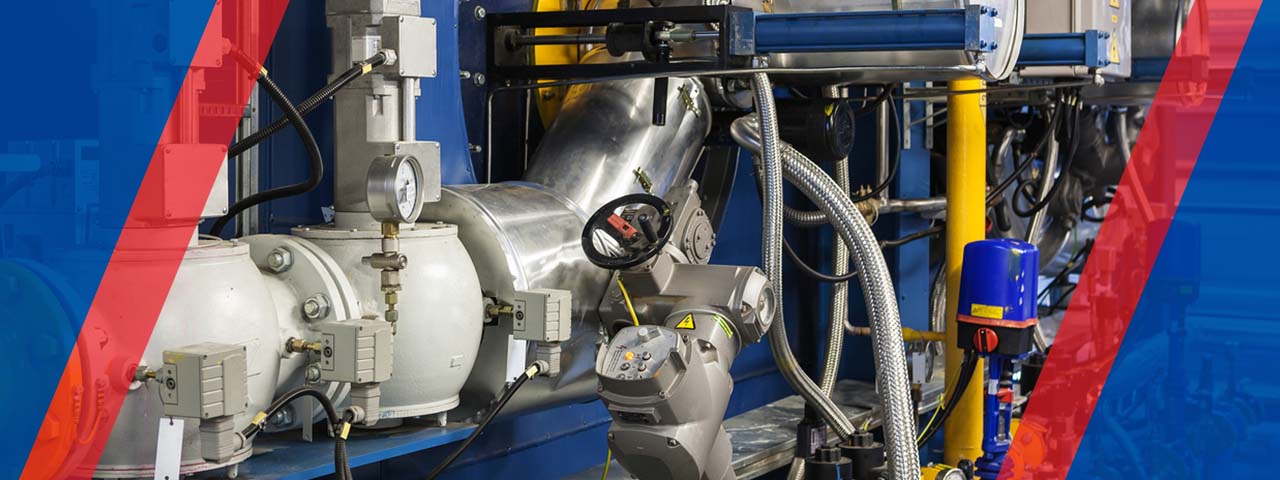
The boiler inside your business needs to be in working order. Pressurized equipment should be monitored to ensure work environments are safe for employees and liquids can be heated accordingly.
If you’re a facility manager, you’ll need to act on commercial boiler maintenance and repairs. Is it better to restore or replace an industrial boiler? The answer will depend on several factors.
Consider the Age of the Boiler
Industrial boilers consume a great deal of energy — the technology runs around the clock to keep your operations moving. It’s important to understand boilers will require replacement at some point. An industrial boiler can last upward of 20-30 years when facility managers schedule regular maintenance.
This estimate is not a guarantee. Expect an increase in maintenance and repair needs for a boiler once the installation approaches or surpasses the manufacturer’s rated service life.
Recurring Repair Needs
Frequent repairs add up. Your business may benefit from a complete boiler replacement when the same issue presents itself repeatedly and your old boiler declines in efficiency. Review maintenance records for your boiler assembly to see whether complications derive from the same components or are widespread.
You may find your industrial boiler starts leaking or grows louder toward the end of its life expectancy. Facility managers can do their part by looking out for buildups and clogs within pipes. How long boiler pipes last will depend on how often they are serviced and environmental conditions. Some areas of a boiler you could see deteriorate are the burner, heat exchanger, combustion chamber and system controls.
Review Boiler Fuel and Energy Costs
Looking at energy use and fuel demands from the time a boiler is installed to the present day is useful for figuring out if you should repair or replace technology. Keep track of facility fuel consumption rates and energy bills to see if there is room for improvement.
Fuel Type Matters
The type of fuel your system needs and how much your plant uses will make it easier to see if repairing or replacing your technology is productive.
Most industrial boilers are powered by coal, oil or natural gas. Coal is becoming less common in the industrial field due to environmental factors. Some businesses choose to integrate boilers that run on biomass, like corn husks and wood chips, to minimize their carbon footprints.
When your industrial boiler runs on a more expensive fuel variety and breaks down often, it’s worth exploring your options for a replacement assembly. Estimating the amount of fuel you’ll use in the future is effective in making the right decision for your plant.
Options for Retrofitting
Maybe your industrial boiler is a few years old but fuel costs are increasing for your build. Facility managers might think about retrofitting their units. This involves changing boiler parts to support a fuel type different than what was intended by the manufacturer.
You could potentially save money by modernizing an industrial boiler with updated parts. Make the transition from solid, liquid or natural fuel to another variety that makes sense for your budget.
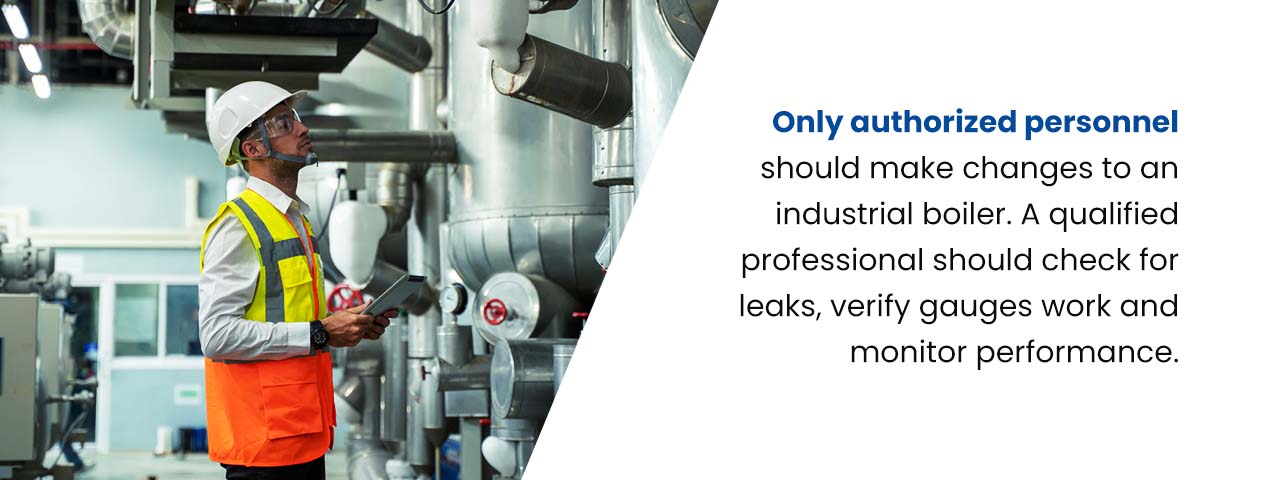
Evaluate Facility Safety Concerns
Look out for your employees when deciding to repair or replace an industrial boiler. Pressurized vessels are dangerous when maintenance intervals are missed. Most boilers feature a pressure relief valve, but there is a chance an unchecked assembly could wear out to the point where superheated steam causes an explosion.
Only authorized personnel should make changes to an industrial boiler. A qualified professional should check for leaks, verify gauges work and monitor performance. Attending to a cracked boiler or rusting surfaces with an experienced technician is essential for creating a safe workplace. The technician you rely on for system inspections should inform you when adding a new unit to your plant is the best course of action.
Boiler Problems to Address Quickly
The following details describe situations when an industrial boiler may fall short of compliance standards:
- Surges and pulsations: There is a chance the burner or combustion fan is disrupting the flow of fuel and air throughout the boiler assembly.
- Boiler stops suddenly: This indicates safety controls have kicked on due to faulty operation controls. Safety features stop the boiler from running to reduce the chances of an accident.
- Temperatures skyrocket: A qualified technician may find a boiler’s operating conditions unsafe because of decreased water levels or poor water quality.
Investigate Boiler Configuration and Efficiency Issues
A popular boiler setup involves having two units in a facility. One boiler is the primary assembly and carries the heating load while the opposite boiler is for emergencies. This configuration works well for heating and power, but it is far from the most efficient.
Boiler technology is capable of changing its firing rate to accommodate different loads. Once a load plummets below an assembly’s minimum rate, it’s common for the unit to power down. The cycling process puts additional stress on boiler parts when temperatures fluctuate. A facility manager might think about adding several small boilers in a plant and configuring them to turn on with increasing loads.
This setup keeps professionals ready for emergencies and eliminates the need for cycling. Improve efficiency and system reliability, as the shutdown of one boiler will not influence heating capacity.
Update Your Boiler for Maximum Productivity
A boiler’s efficiency level is typically lowered the longer the unit is in use. Scale inevitably builds up on burner surfaces, and repairs become more of a short-term fix. Just because a boiler is in working condition does not mean you’re getting the highest level of performance out of the installation. Think about replacing an industrial boiler when there is evidence performance levels are not what they used to be.
Choose McNeil Company for Boiler Installation and Repair Services
The experts at McNeil have been serving customers in the metal, petroleum and chemical industries for over 80 years. Whether you’re interested in upgrading from your existing boiler or you could use assistance with a repair, know we’re here for you with locations in New Jersey, Florida and Virginia.
We work on industrial boilers of all sizes and varieties. There’s a reason why industrial organizations trust us to come up with solutions for facilities — our customers are our top priority, and we won’t rest until you’re satisfied with our services. Ask the McNeil team for a quote to hear more about pricing details.
How Do Commercial Boilers Work?
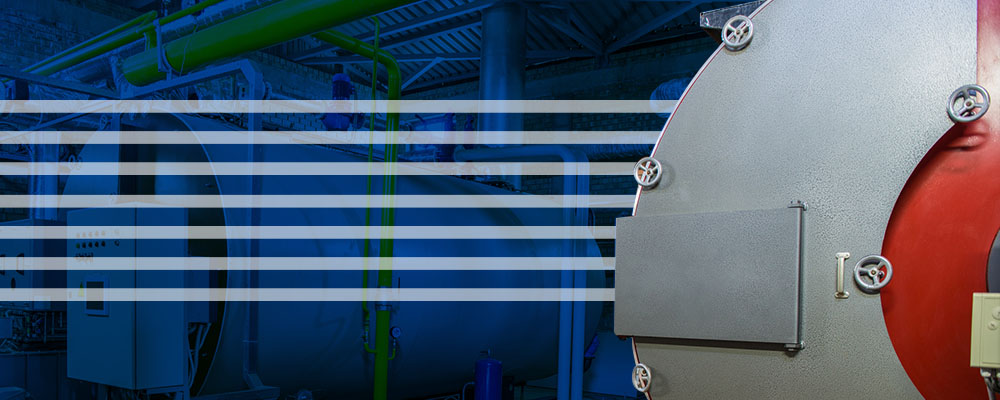
A commercial boiler contains water and transfers heat from a fuel source, such as gas, oil or coal, into steam. The steam is piped to a specific location, allowing it to run equipment, sterilize, steam-clean or provide heat. These boilers are essential to transfer heat energy from one place in your business to another, allowing everything to operate efficiently.
Some commercial boilers use an open system, which allows the steam to return to water form and be reused for different functions. Other boilers run on a closed system, meaning they don’t return the steam to water where it can be reused.
Below, you’ll learn more about how industrial boilers work, the types of boilers and other high-pressure steam boiler basics to help you operate your building’s equipment effectively.
Parts of a Commercial Boiler
Generally, commercial boilers contain the same parts and components essential for effective heating. Some of the standard components of a commercial boiler include:
- Burner: The burner is responsible for providing the flames that heat the water in the vessel. The burner helps create a mixture of fuel and oxygen, allowing the fire to burn efficiently and consistently.
- Combustion chamber: This is the area in the boiler where fuel burns to assist with heating the water. The combustion chamber is where the burners are located and is designed as a secure and safe location for the combustion of volatile fuel at high temperatures. Typically, combustion chambers are made from steel, cast iron or other heavy-duty metals.
- Heat exchanger: This vital component transfers the burners’ heat to the water, allowing it to create steam. Heat exchangers are usually made of copper, steel, cast iron or heavy-duty metal.
- Exhaust stack: This component is also called the flue. It consists of a series of pipes that carry exhaust fumes away from your facility’s interior and outside. An exhaust stack must be carefully constructed to ensure toxic fumes, such as carbon monoxide, are safely removed from your facility’s interior.
- Controls: System controls are an essential part of a commercial boiler, allowing you to set the water temperature, internal pressure, ignition, and fuel and air supply mixtures. You can control how often your burner fires, the rate at which your fuel is used and the quality of the fuel and oxygen mixture. The controls have safety features, allowing you to ensure your system stays operational.
All of these components are essential to a boiler, allowing it to operate safely and efficiently within your business. Without one of these components, your boiler couldn’t provide heating or other essential functions to your commercial enterprise.
How a Commercial Boiler Operates
There are different commercial boilers you can use. However, most boilers work similarly, using burning fuel or electricity to create heat and provide a hot water supply to a building. Depending on the type of system, the boiler may produce steam or hot water, which is then circulated in the pipes within a commercial facility.
Electric coils or fuel burners create heat in a boiler, which is transferred to the water from the heat exchanger. The hot water or steam travels through pipes within the building to the designated area. The water or steam enters the radiators of other heating systems in the building to disperse the warmth, allowing you to keep a space at your desired temperature.
The end goal of a commercial boiler is to produce consistent heat within a commercial building, whether it’s an office, medical facility, apartment complex or school.
Commercial Boiler Maintenance and Safety Tips
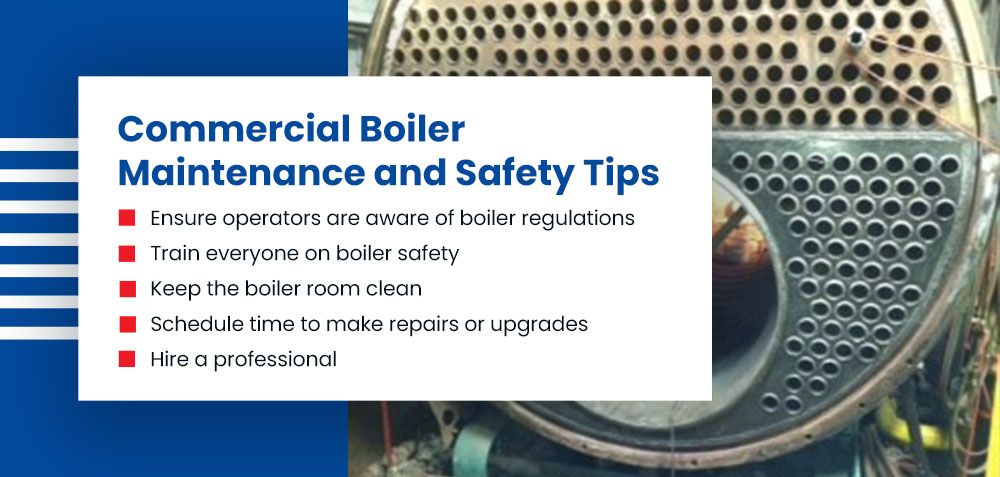
Remember that boilers contain steam or hot water under high pressure, so boiler maintenance is essential to sustain your boiler’s life span. You must take the proper steps to ensure your boiler stays clean and works correctly.
Hot water or steam leaks can cause significant damage or injuries. In some cases, boilers can explode when not adequately maintained, creating the potential for severe injuries or death.
You can follow some of the tips below to keep your boiler properly maintained:
- Ensure operators are aware of boiler regulations: Boiler operation regulations vary by state. For example, most states require your boiler to be inspected yearly, but some don’t. You should make any rules or regulations available to anyone who comes in contact with the boiler to ensure they follow protocol.
- Train everyone on boiler safety: While boiler explosions are rare, they can still happen. It’s essential to train operators on boiler safety, so they know what to look for, including temperature and water or pressure levels. They should also be able to spot signs of corrosion to ensure it’s handled correctly and quickly.
- Keep the boiler room clean: An unorganized or dirty boiler room can create a hazard. You also don’t want to store any flammable materials in a boiler room for the same reason. You should also consider restricting access to the boiler room to technicians and operators who have training in basic boiler safety so you don’t risk injuries and the area stays clean.
- Schedule time to make repairs or upgrades: A boiler requires repairs and upgrades throughout its lifetime. You may need to schedule some downtime for these repairs or upgrades, which means you can use rental boilers while yours is being repaired or upgraded. Even with a rental boiler, you’ll still need to inspect it regularly to ensure everything is working.
- Hire a professional: You should hire a professional to conduct your maintenance and repairs to ensure your boiler is taken care of properly. Professionals have the experience and knowledge to perform high-quality maintenance and repairs when necessary efficiently.
Schedule Boiler Installation or Repair With McNeil
If you need professional help with boiler installation or repairs, McNeil is here to help. We offer high-quality boiler installation services to help you install complex equipment that’s efficient and safe for your commercial processes.
We also offer boiler repair services when your boiler needs maintenance or repairs for specific components. We can work on all commercial boilers, whether you use electricity, gas, hot water or steam.
You can utilize our repair and installation services from any of our Florida, Virginia, or New Jersey facilities. When you choose us, you can rest assured we’ll exceed your expectations and help you keep your commercial operations functional.
Contact us today to learn more about our boiler services or get a quote!
Annual Steam Boiler Open and General Maintenance
One of the essential parts of maintaining industrial steam boilers is the annual steam boiler open. You can schedule maintenance checks every one to two years, depending on the kind of steam boiler you have.
High-pressure steam boilers — those above 15 psi — need inspections at least once a year to maintain their function. Low-pressure systems can perform well with assessments every two years. Your steam boiler technician will address a few standard issues during the maintenance check and ensure that your system is ready to work until the next inspection.
Steam Boiler Maintenance Inspection
You should open your boiler before the inspection so that the technician has easy access to the system’s interior. Remove the front and rear doors on the fire side. On the water side, remove the oblong plates covering the hand holes, which are only used for inspection purposes. The technician will perform two sets of inspections on each side.
Be sure to remove all caps from the low water cut-off and the manway hole on top of the boiler before the technician arrives. Your technician should easily access all parts of the boiler, including the main water line and tubing. After the boiler is open, the technician will check both components.
Water Side Inspection
Scale, sediment and other buildup are common on the water side. Your technician will look for signs of buildup within the boiler and on the connecting lines. This buildup can:
- Increase fuel demand for the same output.
- Hinder valve movement.
- Create incorrect readings on sight glasses.
Your technician will also check for pitting in the tubes. Pitting occurs from oxidation or chemical interactions and results in small depressions in the tubing. If left untreated, pitting can lead to leaking, and you may need to replace the tubes in your boiler.
Fire Side Inspection
On the fire side, the technician will check for soot buildup. Soot buildup impacts heat transfer, much like sediment buildup on the water side. A 1/8 inch buildup of soot can cause a 47% heat loss in a standard boiler. Your boiler will have to work harder to produce the same amount of heat, which leads to more energy use and higher costs.
The technician will also check the refractory material and the tube sheet. They will look for cracks and other signs of damage that could lead to leaks. If there are signs of wear, they’ll perform a magnetic particles test to make sure the internals are safe and detect any potential leaks.
After the inspection, you can put your boiler back together. We recommend using new gaskets after every inspection to ensure optimal performance throughout the following year.
Contact McNeil for More Information
McNeil provides high-quality construction materials and heat management solutions. We’ve provided superior service and supplies for furnaces, boilers and incinerators since 1937. If you need an expert’s advice to find suitable materials for your equipment, we can help.
Contact us online today to find out more about our services and learn how to care for your boiler throughout the year.



